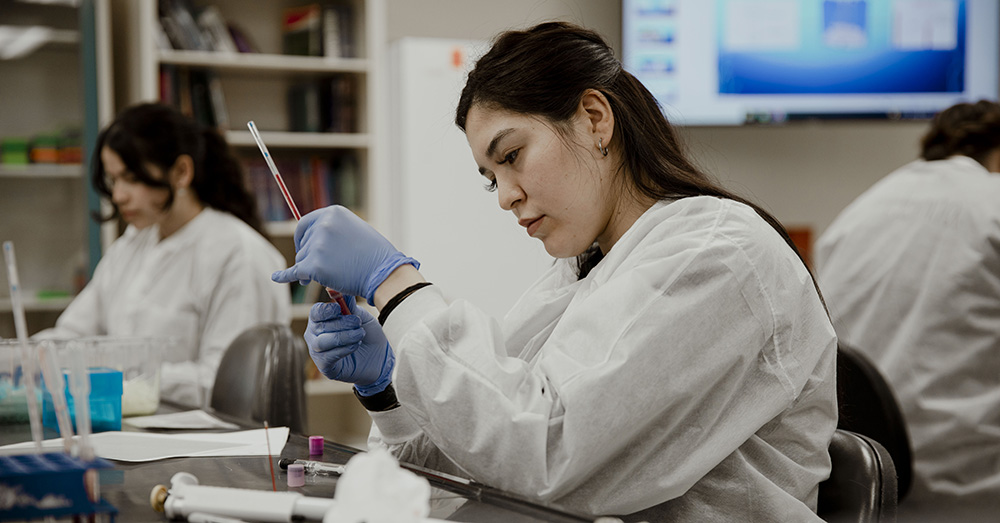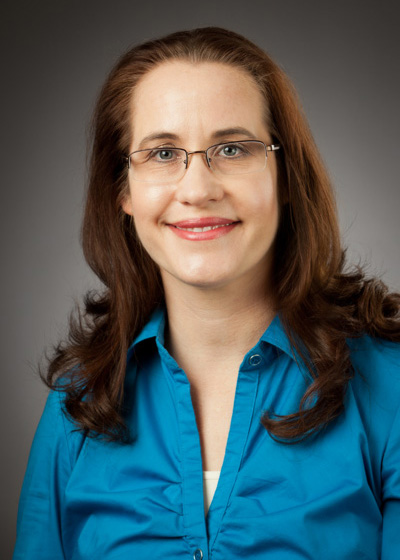TTUHSC Clinical Laboratory Science Program Transforms to Medical Laboratory Science in 2023
This name change is important in establishing the identity of the profession.

The program will soon be known as Medical Laboratory Science
The Clinical Laboratory Science Program at Texas Tech University Health Sciences Center offers a traditional face-to-face bachelor’s degree in clinical laboratory science and a second bachelor’s degree or clinical laboratory science certificate program in an online hybrid format.
Beginning in Fall 2023, the program will change its name to Medical Laboratory Science.
We sat down with Tammy Carter, BS, Ph.D., MT(ASCP), MB(ASCP), about the name change and if it will have any other impact on the program. Carter has served as the Clinical Laboratory Science Program Director since 2016.
Who Does What in the Lab
There are several different jobs in the lab, all with different amounts of required training and credentials. A better understanding of these roles helps explain the need for a change in name.
The entry point in the lab is the position of Lab Assistant. A Lab Assistant requires an undergraduate degree in science. Phlebotomists working in labs must complete a certification exam.
The next level is Medical Laboratory Technician, which requires an associate’s degree and specific training for working in a medical lab.
The role that requires the most training and credentials is the Medical Laboratory Scientist. For this position, one must complete a bachelor’s degree from an accredited program and receive professional training in all experiments.
"We have to know the appropriate specimen for the test being ordered, how to prepare the specimens for testing, as well as the procedures and skills required to test the specimens which sometimes require the use of complex analyzers,” Carter explains. “We then have to analyze patient results to make sure the results are accurate and valid before submitting them to the doctor.”
Lab History

Tammy Carter, BS, Ph.D.
“There’s a huge confusion in the requirements for our profession as well as who we are in the hospital,” Carter explains. “We’re technically in the lab and we don’t have contact with patients, for the most part. It’s not well-advertised what the credentials are for the requirements in our field.”
Carter continues that 1973 was the first time it was required for someone working in a clinical lab to have a Bachelor’s degree.
“Before that, training was on the job,” she says.
In 1988, Congress passed the Clinical Laboratory Improvement Amendment (CLIA ‘88), which all pathology labs must abide by.
Carter says that one issue with CLIA ‘88 is that it uses broad-based statements to identify the qualification requirements of laboratory personnel. Due to this, the responsibility of ensuring the qualification requirements is left up to each individual state.
Hospital administration and lab managers have used broad-based statements in CLIA 88 to hire people for laboratory positions that they are not qualified for. For example, lab assistants are performing tasks that should be under the responsibility of the medical laboratory scientist. However, they are not certified to perform these tasks and only receive pay for the lab assistant level.
There is a shortage in the field due to programs shutting down in the 90s. Fewer programs mean fewer Clinical Laboratory Scientists. In an effort to address the shortage, legislation is being considered that would allow nurses to perform complex lab testing. This is a cause for alarm, according to Carter.
“Nurses are trained in different medical areas than laboratory scientists,” she stresses. "They don't have the education or training required to perform all of the high complexity tests in the clinical and pathology lab. They have neither the background nor expertise to validate or calibrate the analyzers, utilize these analyzers to run tests appropriately, analyze the test results for accuracy, and release the values to the providers,” she explains.
“Nurses have clinical training, but in their field, not for what we do,” Carter continues. "Nurses have not been trained to perform high complexity testing. For testing purposes, they have only been approved to perform waived point-of-care testing procedures in which quality control and quality assurance verification are still under the responsibility of the pathology lab."
What’s in a Name?
Carter explains that the change from Clinical Laboratory Science to Medical Laboratory Science is important in establishing the identity of the profession and helps ensure hospitals identify the different laboratory positions and the appropriate credentials required for each.
“As a program, it’s important to support that change, to solidify the identity of the career, and make sure individuals with the correct credentials are being hired,” she says. “It’s also important for recruitment. People interested in a medical laboratory science career will be able to search for available MLS programs easier when the program name matches the name of the profession."
Carter recommends the position paper, Standardizing the Professional Title of Medical Laboratory Professionals American Society for Clinical Laboratory Science (ASCLS) for an in-depth explanation of the change.
They summarize the choice like this:
What’s in a name? Everything important to our profession — our professional identity, as well as recognition from the healthcare team, administration, government agencies, and the public. In addition, it affects recruitment to, and retention in, our profession. It is time we move to one name — Medical Laboratory Scientist
Carter is quick to point out that the program’s new name will not affect any changes to its curriculum or training.
"We are just solidifying that the student’s diploma matches the credentials required in the field,” she says.
And in the field, Carter believes the name change will protect people who are Lab Assistants and not being paid properly.
“They are being used to perform tasks in the clinical lab that they are not qualified to perform and, without the proper training, diagnostic mistakes can be made,” she says.
The TTUHSC Difference
“I have a passion for teaching these students, and I love the medical laboratory science
profession,” Carter says. "We are continuously recruiting and looking for people that
love the lab. When recruiting at high schools or to undergraduates at colleges and
universities, I find that most students have not heard of the medical laboratory science
degree or career. Many students are excited to learn that this medical option exists."
This program is also good for students that are looking for experience in the medical
field and plan to continue their education in a graduate program with a focus on medicine
or research.
It’s a degree that can open a lot of doors, Carter says. From diagnosing patients to developing tests for COVID, there’s a need for reliable, trained scientists working in medical labs. The demand is high, and Carter is pleased to note that all of her students receive job offers upon graduation. “For me, it’s very rewarding to see my students succeed and know that their hard work is helping save lives,” Carter says. “I feel I have the best job in the world.”
Related Stories
TTUHSC Receives $1 Million Gift from Amarillo National Bank to Expand and Enhance Pediatric Care in the Panhandle
TTUHSC School of Medicine leaders accepted a $1 million philanthropic gift from Amarillo National Bank on Tuesday (Feb. 10), marking a transformational investment in pediatric care for the Texas Panhandle.
Texas Tech University Health Sciences Center Permian Basin Announces Pediatric Residency Program Gift
TTUHSC Permian Basin, along with the Permian Strategic Partnership and the Scharbauer Foundation, Feb. 5 announced a gift that will fund a new pediatric residency.
The Ph.D. Programs that Shape Health Care
The Graduate School of Biomedical Sciences Ph.D. programs at TTUHSC provide the foundation, mentorship and research opportunities you need to pursue groundbreaking work.
Recent Stories
The John Wayne Cancer Foundation Surgical Oncology Fellowship Program at Texas Tech University Health Sciences Center Announced
TTUHSC is collaborating with the John Wayne Cancer Foundation and has established the Big Cure Endowment, which supports the university’s efforts to reduce cancer incidence and increase survivability of people in rural and underserved areas.
TTUHSC Receives $1 Million Gift from Amarillo National Bank to Expand and Enhance Pediatric Care in the Panhandle
TTUHSC School of Medicine leaders accepted a $1 million philanthropic gift from Amarillo National Bank on Tuesday (Feb. 10), marking a transformational investment in pediatric care for the Texas Panhandle.
Texas Tech University Health Sciences Center Permian Basin Announces Pediatric Residency Program Gift
TTUHSC Permian Basin, along with the Permian Strategic Partnership and the Scharbauer Foundation, Feb. 5 announced a gift that will fund a new pediatric residency.
